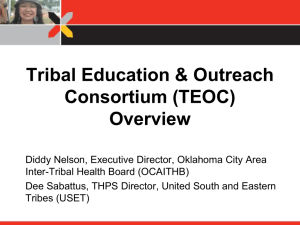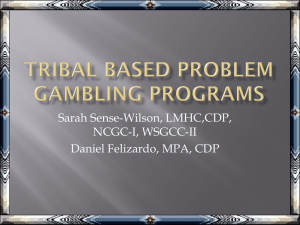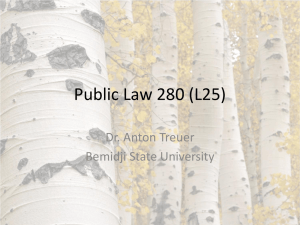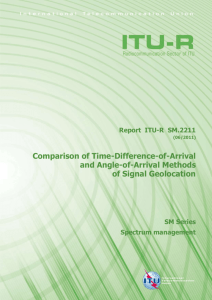Resources for Elders (ACL)
advertisement
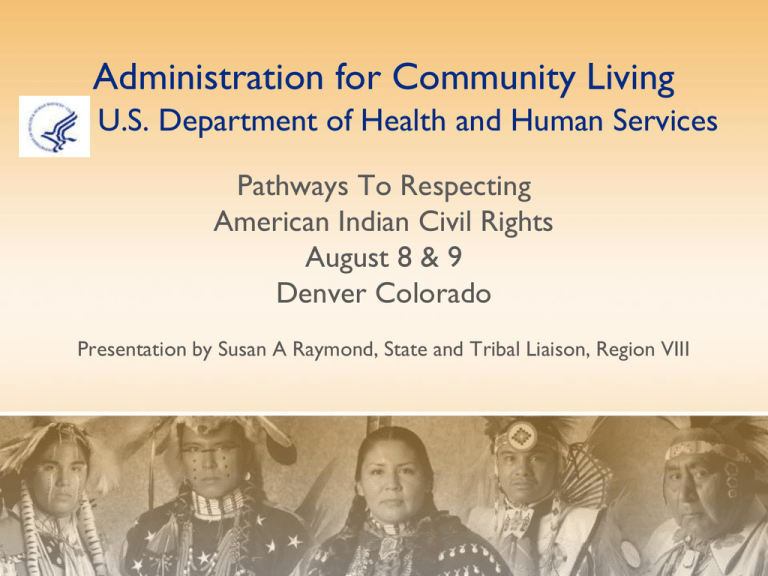
Administration for Community Living U.S. Department of Health and Human Services Pathways To Respecting American Indian Civil Rights August 8 & 9 Denver Colorado Presentation by Susan A Raymond, State and Tribal Liaison, Region VIII Older Americans Act of 1965 as amended • Congress declared that in keeping with the traditional American concept of the inherent dignity of the individual in our democratic society, the older people of our Nation are entitled to, and it is the joint duty and responsibility of the Federal, State, Tribes and local government to assist older people to obtain: • Adequate income in retirement • Best possible physical and mental health • Obtain and maintain suitable housing at costs they can afford • Restorative services for those who need institutional care; comprehensive long term care services; community based services; family and caregiver support • Employment free of discriminatory practices • Retirement in health, honor, and dignity • Participation in meaningful activity; civic, cultural, educational, training and recreational opportunities • Efficient community services including transportation • Immediate benefit from proven research which sustains and improves health • Freedom, independence and free exercise in planning and participation in services and programs that benefit them and protect against abuse, neglect and exploitation. Introduction of the Administration for Community Living “For too long, too many Americans have faced the impossible choice between moving to an institution or living at home without the long-term services and supports they need. The goal of the new Administration for Community Living will be to help people with disabilities and older Americans live productive, satisfying lives.“ ~ Secretary Kathleen Sebelius April 16, 2012 Administration for Community Living Mission To develop a comprehensive, coordinated and cost-effective system of long-term care that helps elderly individuals to maintain their dignity in their homes and communities. Our mission statement also is to help society prepare for an aging population. Administration on Aging Overview • Better Health/Quality of Life: • Older Americans Act Title III and VII • Discretionary grants: Evidence-based Prevention Program (CDSMP, falls, mental health, physical activity, care transitions grants ) • Senior Community Services Employment Program • Caregiver • Better Care: • Single point of entry AAA’s and ADRCs • Participant-directed programs that support community living: Money Follows the Person (MFP) and Veterans-Directed Home and CommunityBased Services (VDHCBS) • Lower Costs: • The Senior Medicare Patrol (SMP) • State Health Insurance Program (SHIP) and Benefit Enrollment Centers Organizational Structure Office for American Indian, Alaska Native, and Native Hawaiian Programs • The Office for American Indian, Alaska Native, and Native Hawaiian Programs was established in 1984 and is charged to serve as an advocate on behalf of Native American elders in relation to all Federal policies affecting elders. And to advocate with the States to promote the enhanced delivery of services and implementation of programs to older Native Americans. • The Office has oversight of grants to Tribes; chairs the Interagency Task Force on Older Indians; develops research plans and conducts research on Native American aging; and collects and disseminating information on problems experienced by Native American elders. This includes elder abuse, long-term care, health, and other issues unique to Native Americans. • Under Title VI of the OAA, AoA awards grants directly to Tribes and Tribal organizations and native organizations for nutrition services (including congregate and home delivered meals), information and assistance, transportation, and in-home supportive services. In 2000, as part of an amendment to the Older Americans Act, the Native American Caregiver Support Program was established to assist caregivers of Native American elders who are chronically ill or have disabilities. History of Title VI 1975: Older Americans Act Amendments authorized grants under Title III to Indian Tribal organizations. Transportation, home care, legal services, and home renovation/repair were mandated as priority services. Two events happen in 1978: 1. 2. Creation of Title VI The recognition of Tribal Sovereignty The purpose of Title VI was to promote the delivery of supportive and nutrition services to American Indians and Alaska Natives that are comparable to service offered to other older people under the Title III program in establishing this new Title, Congress identified findings about the needs of older Indians. Although Title VI became a part of the OAA in 1978, funding for the programs were not available until 1980. Separate Appropriation for Title VI In 1981, Congress Amended the OAA to establish a separate appropriation for Title VI. Congress reminded states that older Indians must be counted as part of the state’s total older population, and thus continued to be eligible for all services. 1984 Two events happened: 1. Tribes had to meet the 60+ eligibility to apply for Title VI funds. 2. Tribes could decide the age for Title VI services. Most Tribes elected an age below sixty years old . Established Part B of Title VI – 1991 In 1991 Amendments to the OAA established a new Part B for Title VI that provided programs and funding for Native Hawaiians. Title VI, Part A • Federally Recognized Tribes to include American Indians and Alaska Natives • Comparable to services provided under Title III • Direct funding to Tribal Organizations • Addressing nutrition and supportive services to include information and assistance Title VI, Part B • Public or nonprofit private organization representing Native Hawaiian elders; • Native Hawaiian means any individual any of whose ancestors were native of the area which consists of the Hawaiian Islands prior to 1778 • Serves at least 50 individuals age 60 and over in the identified service area; • Demonstrates the ability to deliver supportive services, including nutritional services; • Comparable to services provided under Title III. Part C – NA Caregiver Program • Eligible if a Title VI, Part A or B applicant • Five Required Services: • • • • Information Assistance Individual counseling, support groups, training Respite – elder meets the definition of frail and services are temporary and intermittent • Supplemental services – on a limited basis to caregivers caring for frail elders Title VI Caregiver Program The program assists caregivers through: • A network of Community Resource Providers to help them locate resources and services • Referrals to appropriate service providers to meet their specific needs • Providing health information • Support groups, one-on-one counseling, and training sessions • Providing a Resource Directory, Training Manual, and video library for Caregiver training • Providing Respite Care to temporarily relieve caregivers of their caregiving responsibilities • Lending libraries Reasons for Coordination • Provides expanded program services to meet the needs of Tribal Elders • Improves quality of life for Tribal Elders • Increases awareness and expands community support for the Tribal Elders Program • Supports family efforts to care for loved ones at home and in their community • Reduces duplication of services • Develops partnerships to address unmet needs • Informs community about services available to benefit Tribal Elders • Expands resources including funding, staff training, facilities, equipment, etc. GOOD NEWS! Health Promotion and Disease Prevention Works Longer life Reduced disability Improved mental health Lower health care costs Evidence-Based Health Promotion and Disease Prevention Programs for Older Adults • • • • • • • • • A Matter of Balance Active Choices Active Living Every Day EnhanceFitness EnhanceWellness Fit & Strong! Healthy IDEAS Healthy Moves Medication Management • PEARLS • Prevention and Management of Alcohol Problems in Older Adults • Stanford Chronic Disease SelfManagement Programs • Stepping On • Strong for Life • Tai Chi CDSMP Participants - Chronic Conditions Additional Information For further information about ACL AoA please contact: Regional Support Centers – Title VI Lead Staff Region I: CT, MA, ME, NH, RI, VT Gene Brown (lead for both Regions I & II) Gene.Brown@aoa.hhs.gov John F. Kennedy Bldg., Rm. 2075 Boston, MA 02203 Phone: 617-565-1164 Fax: 617-565-4511 Regions II: NY, NJ, PR, VI, DC, DE, MD, PA, VA, WV Barry Klitsberg Barry.Klitsberg@aoa.hhs.gov 26 Federal Plaza, Rm. 38-102 New York NY 10278 Phone: 212-264-4590 Fax: 212-264-0114 Region IV: AL, FL, GA, KY, MS, NC, SC, TN Joyce Robinson-Wright Joyce.Robinson-Wright@aoa.hhs.gov Atlanta Federal Center 61 Forsyth Street, SW - Suite 5M69 Atlanta, GA 30303-8909 Phone: 404-562-7594 Fax: 404-562-7598 Region V: IL, IN, MI, MN, OH, WI Sam Gabuzzi Sam.Gabuzzi@aoa.hhs.gov 233 N. Michigan Ave., Suite 790 Chicago , IL 60601-5519 Phone: 312-866-2878 Fax: 312-886-8533 Region VI: AR, LA, OK, NM, TX Larry McClendon Larry.McClendon@aoa.hhs.gov 1301 Young St. , Rm. 736 Dallas , TX 75201 Phone: 214-767-1841 Fax: 214-767-2951 Region VII: IA, KS, MO, NE Sam Gabuzzi Sam.Gabuzzi@aoa.hhs.gov 601 East 12th Street Kansas City, MO 64106 Phone: 312-886-2878 Fax: 312-886-8533 Additional Information continued Region VIII: CO, MT, UT, WY, ND, SD Susan Raymond Susan.Raymond.@aoa.hhs.gov 999 18th Street, South Terrace, Ste 496 Denver CO 80202 Phone: 303-844-7818 Fax: 303-844-2943 Region IX: CA, NV, AZ, HI, GU, CNMI, AS Anna Cwirko-Godycki (shared responsibility for California Tribes) Anna Cwirko-Godycki@aoa.hhs.gov (415) 437-8788 Darrick Lam (shared responsibility for California Tribes) Darrick Lam@aoa.hhs.gov (415) 437-7872 Dennis Dudley (Arizona and Nevada Tribes) Dennis Dudley@aoa.hhs.gov (415) 437-8789 90 - 7th Street, T-8100 San Francisco, CA 94103 Phone: 415-437-8 Fax: 415-437-8782 Region X: AK, ID, OR, WA Terry Duffin (AK & OR) Terry.Duffin@aoa.hhs.gov Jeanette Burkett (ID & WA) Jeanette.Burkett@aoa.hhs.gov Blanchard Plaza , RX-33; Rm. 859 2201 Sixth Avenue Seattle , Washington 98121 Phone: 206-615-2298 Fax: 206-615-2305 Resources • • • • • • • www.OlderIndians.aoa.gov www.aoa.gov www.hhs.gov/acl www.nationalservice.gov http://www.nationalservice.gov/for_organizations/indian_communities/index.asp http://www.americorps.gov/for_organizations/indian_communities/index.asp http://www.americorps.gov/for_organizations/indian_communities/resources.asp

